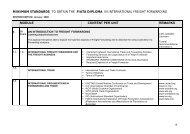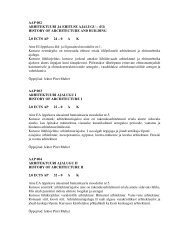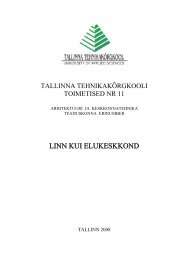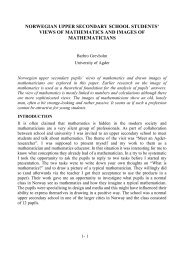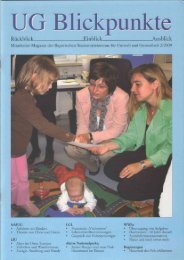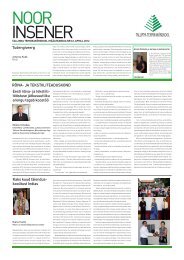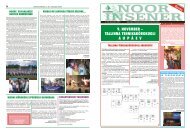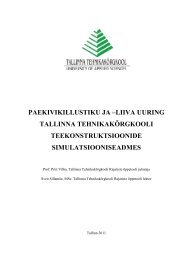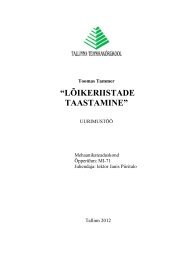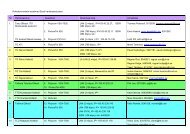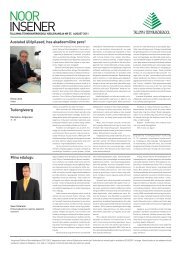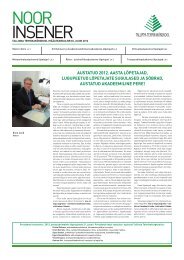TEACHER KNOWLEDGE OF STUDENTS' MATHEMATICAL ERRORS
TEACHER KNOWLEDGE OF STUDENTS' MATHEMATICAL ERRORS
TEACHER KNOWLEDGE OF STUDENTS' MATHEMATICAL ERRORS
Create successful ePaper yourself
Turn your PDF publications into a flip-book with our unique Google optimized e-Paper software.
<strong>TEACHER</strong> <strong>KNOWLEDGE</strong> <strong>OF</strong> STUDENTS’ <strong>MATHEMATICAL</strong><br />
<strong>ERRORS</strong><br />
Aihui Peng<br />
Umeå Mathematics Education Research Centre, Umeå University, Sweden<br />
Analysing students’ mathematical errors is a fundamental aspect of teaching for<br />
mathematics teachers, and it is challenging which demands teachers to have specific<br />
knowledge. This study aims to investigate how mathematics teachers are<br />
knowledgeable about their students’ mathematical errors. Within the theoretical<br />
framework for examining mathematics teacher knowledge as used in error analysis, it<br />
was conducted with a questionnaire and in-depth interviews, in which 25 middle<br />
school teachers participated. The results show that although teachers’ knowledge of<br />
students’ mathematical errors differs in different tasks, there are emerging patterns<br />
on the extent of knowledgeable of students’ mathematical errors for mathematics<br />
teachers.<br />
INTRODUCTION<br />
Mathematical errors are a common phenomenon in students’ learning of<br />
mathematics. Students of any age irrespective of their performance in mathematics<br />
have experienced getting mathematics wrong. It is natural that analyzing students’<br />
mathematical errors is a fundamental aspect of teaching for mathematics teachers.<br />
Due to the challenge from the variety and complexity of students’ mathematical<br />
errors, it is important that mathematics teachers require specific knowledge for<br />
analyzing students’ mathematical errors. However, although there is increasing<br />
interest in mathematics knowledge for teaching, there is still a lack of detailed<br />
understanding regarding how mathematics teachers are knowledgeable of students’<br />
mathematical errors. This study will give a nuanced understanding of it through<br />
empirical investigation.<br />
LITERATURE REVIEW<br />
Students’ errors in mathematics learning are a world-wide phenomenon, and there is<br />
a long history for error analysis in mathematics education (Radatz, 1979). Due to the<br />
variety and significance of students’ mathematical errors, it attracts a number of<br />
researchers’ interests, which leads to the formation of many theories about the nature<br />
of mathematical errors, their interpretation and the ways of overcoming them<br />
(Gagatsis & Kyriakides, 2000; Luo, 2004). For example, focusing on the student’s<br />
cognitive process, Davis (1989) proposed two kinds of regularity about students’<br />
1- 1
mathematical errors, the first regularity refers to certain errors made by different<br />
students that are extremely common, and the second kind of regularity refers to the<br />
wrong answers given by one person, in response to a sequence of questions.<br />
Brousseau (1981) used historical elements in order to explain pupils’ errors in<br />
decimal factions, and he found that pupils make the same errors independently of the<br />
teaching methods used and, thus, concluded that there are errors that can be attributed<br />
to the pupils’ epistemological foundations. And there is the widely recognized<br />
conceptual change framework, within which errors initially conceptualized<br />
negatively are now seen as a natural stage in knowledge construction and thus<br />
inevitable (Vosniadow & Verschaffel, 2004)<br />
At the same time, in the past two decades, there has been a significant and developing<br />
research focus on teacher knowledge since Shulman (1986) introduced the notion of<br />
‘pedagogical content knowledge’ (PCK), which emphasized knowledge of students’<br />
thinking about particular topic, typical difficulties that students have, and<br />
representations that make mathematical ideas accessible to students. Research on<br />
teacher knowledge has expanded from studies of teachers’ subject-matter knowledge<br />
of various content areas to the organization of teachers’ knowledge for teaching<br />
particular content to students (Ball, 1990; Even, 1993; Peng, 2007; Izsak, 2008). This<br />
expansion follows a generation of research that emphasizes knowledge of content and<br />
students, include the ability to anticipate student errors, to interpret incomplete<br />
student thinking, to predict how students will handle specific tasks, and what students<br />
will find interesting and challenging. In this aspect, Hill et al. (2008) identified that<br />
responding to students inappropriately—the degree to which teacher either<br />
misinterprets or, in the case of student misunderstanding, fails to respond to student<br />
utterance as a key aspect of the mathematical quality of instruction. Peng and Luo<br />
(2009) developed a framework to investigate mathematics teacher knowledge as used<br />
in error analysis.<br />
From the literatures, it can be observed that there are insights from studies in both<br />
analysing students’ mathematical errors and mathematics teacher knowledge, but it<br />
lacks of how mathematics teachers are knowledgeable of students’ mathematical<br />
errors, especially absence of empirical evidences. This study aims to fill this gap<br />
within the existed framework.<br />
THEORETICAL FRAMEWORK<br />
In Peng and Luo (2009), the framework below (shown in Table 1) is introduced in<br />
order to analysis teacher knowledge of students’ mathematical errors. The framework<br />
includes two separate dimensions, namely, the nature of mathematical error and the<br />
phrases of error analysis, which are closely linked together in a complex way. There<br />
are four keys for the nature of mathematical error, namely, mathematical, logical,<br />
strategical and psychological, and the four keys for the phrases of error analysis,<br />
namely, identify, interpret, evaluate, and remediate.<br />
1- 2
Peng<br />
Dimension<br />
Nature<br />
of<br />
mathematical<br />
errors<br />
Phrases<br />
of<br />
error<br />
analysis<br />
Analytical<br />
categorization<br />
1- 3<br />
Description<br />
Mathematical Confusion of concept and characteristics,<br />
neglect the condition of formulas and<br />
theorem<br />
Logical False argument, rearrange concept,<br />
improper classification, argue in a circle,<br />
equivalent transform<br />
Strategical<br />
Couldn’t distinct from pattern, lack of<br />
integral concept, not good at reverse<br />
thinking, couldn’t transform the problem<br />
Psychological Mentality deficiency, lack proper mental<br />
state<br />
Identify Knowing the existence of mathematical<br />
error<br />
Interpret Interpretting the underlying rationality of<br />
mathematical error<br />
Evaluate Evaluating students’ levels of performance<br />
according to mathematical error<br />
Remediate Presenting teaching strategy to eliminate<br />
mathematical error<br />
Table 1: A framework for examining mathematics teacher knowledge as used in error<br />
analysis<br />
This framework is used in this study for research design and data analysis.<br />
METHODOLOGY<br />
Participants<br />
25 middle school mathematics teachers in their short in-service training courses<br />
participated in this study. There are 10 males and 15 females. And there were 2, 16, 7,<br />
respectively for the degree of master, bachelor, associate degree. Their years of<br />
teaching ranged from 1 to 38. And all of them expressed that they’d like to provide<br />
the data relevant to the reliability and validity of this study.
Instruments<br />
Data were collected with an author-constructed Mathematical Error Analysis<br />
Questionnaire and in-depth interviews followed the questionnaire. The questionnaire<br />
consisted of four tasks that were designed to examine how mathematics teachers<br />
analyse student’s mathematical errors in typical algebraic and geometric topics of<br />
polynomial, equation and triangle. Each of the four tasks focused on mathematics<br />
teacher knowledge of identifying, addressing, diagnosing, and correcting student’s<br />
mathematical errors, preferably, every task mainly focused on one aspect of logic,<br />
mathematical knowledge, psychology and strategy. These tasks were examined from<br />
middle school students in a pilot study. After reviewing and analysing the responses<br />
to the questionnaire, every teacher was invited to an in-depth interview to further<br />
explore how teachers understand and handle student’s mathematical errors. Every<br />
interview occurred within 1 hr. The interviewer posed the initial question and then<br />
followed the teacher’s lead, asking follow-up questions based on the teacher’s<br />
responses. The interviewer cycled back to topics to elicit more detail. Each interview<br />
was audio taped and transcribed.<br />
Data analysis<br />
Qualitative analysis method was used in the analysis of the questionnaire and the<br />
transcriptions of the interviews. Firstly, 4 different categories consisted of identifying,<br />
addressing, diagnosing, and correcting students’ mathematical errors was identified<br />
which included the responses to every task. Next, different perspectives from logic,<br />
mathematical knowledge, strategy and psychology were identified. The responses<br />
were categorized into groups and assigned a descriptive code. Two researchers used<br />
the resulting codes to analyse the responses independently. Both sets of codes were<br />
compared, and then, through discussion with the third researcher, the disparities were<br />
reconciled to reach valuable agreements on the responses. The coding of the four<br />
tasks of questionnaire was used by T1, T2, T3, and T4. And the investigated teacher<br />
was used by six codes ABCDEF, which represented age, gender, degree, teaching<br />
years, school district and confidence about analysing students’ mathematical errors<br />
respectively.<br />
RESULTS<br />
According to teachers’ responses to questionnaire and interview, their knowledge of<br />
students’ mathematical errors manifested differently in every dimensions of phrases<br />
of error analysis and perspectives for sources of errors. But when they were mixed in<br />
one picture through focusing on every specific task, the distinctive different levels of<br />
knowledgeable of students’ mathematical errors were shown. The results were<br />
presented including the clarification of the levels (see table 2) and exemplification of<br />
the typical features of the levels supported by some interview excerpts (see table 3).<br />
1- 4<br />
Level 1 ● Couldn’t identify the students’ mathematical errors.
Peng<br />
●Couldn’t find the reasonable causes of students’ mathematical<br />
errors; couldn’t find the reasons for students’ mathematical errors or simply<br />
attribute to students’ mathematical errors to such as ‘non-seriousness of<br />
learning’ and ‘poor basic knowledge and basic skills’.<br />
● Couldn’t evaluate the influence of students’ mathematical errors<br />
on their latter learning, couldn’t evaluate students’ levels of performance<br />
according to their mathematical errors.<br />
● Couldn’t present teaching strategies for correcting students’<br />
mathematical errors.<br />
Level 2 ● Could identify the students’ mathematical errors but couldn’t<br />
find the underlying reasons.<br />
● Couldn’t find the reasonable causes of students’ mathematical<br />
errors, could explain the reasons for students’ mathematical errors, but only<br />
consider them as they stand, couldn’t analyse them for advanced viewpoint.<br />
● Could simply evaluate the influence of students’ mathematical<br />
errors on their latter learning, can evaluate students’ levels of performance<br />
according to their mathematical errors to a certain degree.<br />
● Could present teaching strategies for correcting students’<br />
mathematical errors, but not so suit for the specific cases.<br />
Level 3 ● Could identify the mathematical errors of students and find the<br />
underlying reasons.<br />
● Could evaluate students’ mathematical errors from a<br />
reasonable point of view, could analyse students’ mathematical errors for a<br />
singly relative high level theoretical point of view.<br />
● Could properly evaluate the influence of students’<br />
mathematical errors on their latter learning, could evaluate students’ levels<br />
of performance according to their mathematical errors.<br />
● Could present singly teaching strategies for preventing<br />
students’ mathematical errors.<br />
Level 4 ● Could identify the students’ mathematical errors and the<br />
underlying reasons in a right and quick way.<br />
● Could understand the reasonability of students’ mathematical<br />
1- 5



